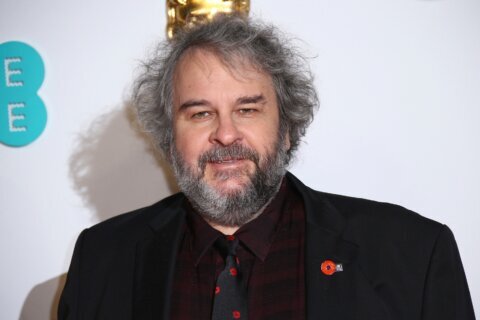WASHINGTON — They are three of the biggest names in Hollywood, and they are all vying for your box office dollar this weekend.
Jennifer Lopez’s new thriller “The Boy Next Door” opens nationwide Friday.
Jennifer Aniston’s pain-killer drama “Cake” opens here in D.C. on Friday.
And Julianne Moore’s Alzheimer’s drama “Still Alice” plays its second weekend here in D.C.
So which one should you see at the movies this weekend?
Time for a triple review:
‘The Boy Next Door’
Jennifer Lopez thrives on versatility, judging “American Idol” on television, popping onto the music charts on radio, styling with fashion on the red carpet, and lighting up the silver screen.
If only she picked better movie projects.
In “The Boy Next Door,” she executive-produces herself in a low-budget erotic thriller, made for less than $4 million. She stars as Claire Peterson, a suburban mother who has recently divorced her cheating husband (John Corbett) when a studly young neighbor Noah (Ryan Guzman) moves in next door. After a moment of weakness sparks a steamy sexual encounter, their love affair spirals into a dangerous obsession that threatens Claire’s family and her job as a school teacher.
If you liked “Selena” (1997), “Anaconda” (1997), “The Cell” (2000) or “Enough” (2002), you will hand your audience sympathies over to Lopez for this journey — though you might regret it by the end.
The presentation feels forced right from the start, beginning with over-the-top voiceover narration, continuing with a series of predictable plot points and culminating in a ridiculous climax.
The age difference between Lopez, 45, and Guzman, 27, isn’t the problem (J-Lo looks more like Elaine Robinson than Mrs. Robinson). The problem is the age difference between Guzman and Lopez’s on-screen son, 19-year-old Ian Nelson. The filmmakers try to pass Guzman off as one of Nelson’s classmates for certain plot reasons, but audiences will snicker when he claims that he’s 20 years old.
Likewise, the steamy sex scene between Lopez and Guzman also isn’t the problem. Director Rob Cohen manages to create something somewhat tasteful with only partial nudity — ironic for the man who directed Vin Diesel in “xXx” (2002). The problem is that he treats the plot points like the title of his successful franchise “The Fast and the Furious” (2001). As Guzman tinkers with the brakes on a vehicle, we’re reminded of how Dan Gilroy did it much better in “Nightcrawler” (2014), allowing Jake Gyllenhaal to gradually plunge into madness as opposed to Guzman’s cookie-cutter obsession.
Debut screenwriter Barbara Curry shouldn’t get discouraged. Juggling romance and thrillers can be tricky for even the best filmmakers; just ask Jason Reitman from “Labor Day” (2014).
Just as “Labor Day” was a cheaper version of Clint Eastwood’s “Bridges of Madison County” (1995), “The Boy Next Door” is a cheaper version of Adrian Lyne’s “Fatal Attraction” (1987). There are also hints of Alfred Hitchcock’s “Shadow of a Doubt” (1943), with a strange new neighbor in town; “Cape Fear” (1962), with a pervert torturing a family, and Sam Mendes’ “American Beauty” (1999), with suburban neighbors staring at each other through their bedroom windows.
And herein lies the difference. There was a moment in “American Beauty” where we thought Ricky Fitts (Wes Bentley) might be a creepy stalker videotaping Kevin Spacey’s daughter from the upstairs window. Instead, the movie flipped our expectations and became a glorious Best Picture winner.
“The Boy Next Door” never flips our expectations. It repeatedly chooses the easy way out instead of working to create something unique. It also relegates its characters to making cliched horror decisions, like refusing to call the police and failing to hit the baddie again after he’s down. Such predictability is disappointing for moviegoers who like to challenge themselves. But it could tickle the fancy of those looking for a mindless, trashy outing on a group date night.
Audiences of both genders will find plenty of eye candy to go around, from J-Lo standing in a slip by the bedroom window to Guzman staring back with his shirtless abs, not to mention some amusing comic relief by the talented Kristin Chenoweth (“Glee”). This cocktail could make for a fun night out at the movies, in an “awesomely bad” kind of way, relishing the communal experience of jump scares.
Just don’t take it seriously.
★★
‘Cake’
While one Jennifer plays up her sex appeal as Claire in “The Boy Next Door,” another Jennifer plays it down as a very different Claire in “Cake,” a solid flick that feels a bit too much like Oscar bait.
Claire Bennett (Jennifer Aniston) is tremendously scarred — literally and figuratively — from a tragic past. She pops pills to deal with back pain, goes through the motions of physical therapy at the swimming pool and attends a support group to deal with the suicide of a close friend.
“Cake” marks the fourth feature film by director Daniel Barnz, after “Phoebe in Wonderland” (2008), “Beastly” (2011) and “Won’t Back Down” (2012). It marks only the second credited screenplay by writer Patrick Tobin, who’s back on the scene nearly two decades after “No Easy Way” (1996).
Together, Barnz and Tobin craft a movie that juggles perspectives between the real and the surreal, as Aniston imagines the ghost of her late friend, played by Anna Kendrick (“Into the Woods”). These shifts are more in the bizarre style of “American Beauty” than the creepy style of “The Sixth Sense,” and while they’re not as daring as masterpieces such as “Black Swan” (2010) or “Birdman” (2014), they serve to spice up a story that would otherwise feel like a Lifetime movie of the week.
The filmmakers deserve credit for trying to turn mundane objects into thematic symbolism, from the cake on the table to the reclining passenger seat in the car. Sometimes it feels forced; sometimes it feels cliche, but at least they’re trying to see everyday objects as something more.
Still, the main reason to see “Cake” is for Aniston’s rare dramatic performance, earning the first real buzz for a dramatic role in her successful career. Even the Razzies announced a new category — the Razzie Redeemer Award, honoring former Razzie recipients who now are doing good work.
Granted, Aniston has seen plenty of awards for her television work, creating a TV icon with Rachel in “Friends” (1994), winning an Emmy in 2002 and a Golden Globe in 2003. This romantic-comedy persona translated nicely to the big screen in movies such as “Office Space” (1999), “Bruce Almighty” (2003), “The Break-Up” (2006) and “Horrible Bosses” (2011).
Now “Cake” has earned Aniston both Golden Globe and Screen Actor Guild nominations, though it’s not all that surprising she was shut out by the Oscars. The performances by Julianne Moore (“Still Alice”), Reese Witherspoon (“Wild”), Rosamund Pike (“Gone Girl”), Felicity Jones (“The Theory of Everything”) and Marion Cotillard (“Two Days, One Night”) are simply better.
But while “Cake” won’t provide Aniston her Charlize Theron-“Monster” moment at the Academy Awards, it at least opens the door to future dramatic roles, proving that in the land of comedy and drama, even our biggest stars can have their cake and eat it too.
★ ★ 1/2
‘Still Alice’
Here’s your homework. Instead of watching the sultry affair of “The Boy Next Door” and the pill-popping addict of “Cake,” go back and watch Julianne Moore do both roles better.
Go rent Lisa Cholodenko’s “The Kids Are All Right” (2010), in which Moore betrays her lesbian lover (Annette Bening) to have an affair with their children’s artificial-insemination father (Mark Ruffalo). Then rent Paul Thomas Anderson’s “Magnolia” (1999), in which Moore plays a pill-popping addict so desperate for her fix that she shouts down an unsuspecting clerk at the pharmacy counter.
Both roles are far superior to Lopez’s and Aniston’s, and will allow you to fully appreciate the enduring narrative this award season — that it’s time for Moore to win a long-overdue Oscar.
“Still Alice” marks her fifth Oscar nomination after “Boogie Nights” (1997), “The End of the Affair” (1999), “The Hours” (2002) and “Far From Heaven” (2002), as well as her third Golden Globe win, after her ensemble part in Robert Altman’s “Short Cuts” (1994) and her role as Sarah Palin in HBO’s “Game Change” (2012), a performance so good that she elevated the real Steve Schmidt (Woody Harrelson) and Nicolle Wallace (Sarah Paulson) to prominent TV roles on cable news and talk shows.
In “Still Alice,” Moore plays a Columbia University linguistics professor diagnosed with Alzheimer’s Disease, causing her to forget the very words around which she has built her entire career.
The gravity of the character allows Moore a number of powerhouse moments to display her acting gifts — the fear in her voice as she breaks the heartbreaking news to her husband (Alec Baldwin); the motherly tone as she apologizes to her daughters (Kristen Stewart and Kate Bosworth) for their genetic fate, and the look of bewilderment as she gets lost during a routine jog around campus.
The authenticity of Moore’s performance elevates a movie that would have otherwise fallen into the trappings of sappy family drama. We don’t see Stewart as the girl from “Twilight” (2008); we see her as Moore’s daughter, and Stewart is all the better for it. Most importantly, we believe Moore’s marriage with Baldwin, capturing all the nuances of a husband trying to help his wife through the most difficult of circumstances, ranging from Baldwin’s anger that she’s forgetting important appointments to Moore’s embarrassment that she can no longer find the bathroom.
You might want to keep some tissues handy for an ending that will wreck you just like “Philadelphia” (1993), but you won’t come away feeling entirely depressed. “Still Alice” isn’t about death; it’s about life. It’s about seeing a death sentence as a reason to start living. And it’s about finding the words to tell loved ones how much they mean to us, knowing that words and memories don’t last forever.
★ ★ ★ 1/2
Follow @WTOP and WTOP Entertainment on Twitter and WTOP on Facebook.








